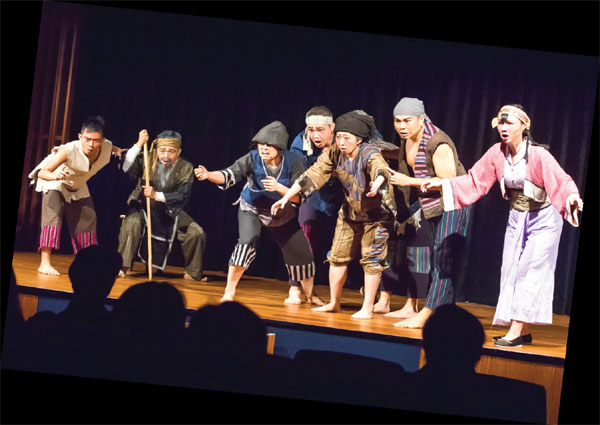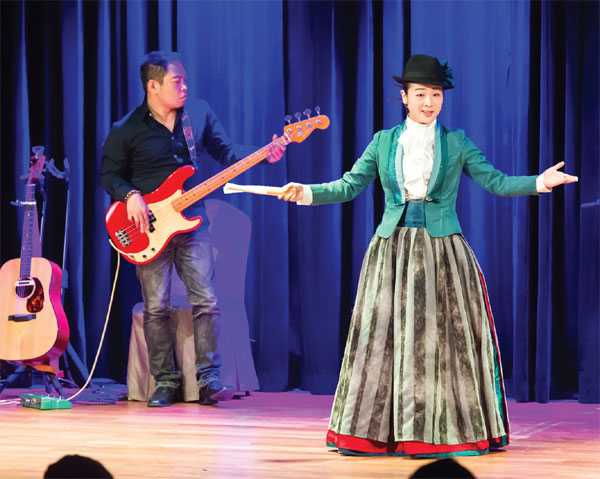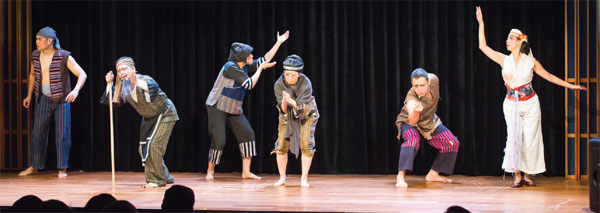From Sichuan, via Korea
Updated: 2014-12-16 08:02
By Chitralekha Basu(HK Edition)
|
|||||||||
One of Bertolt Brecht's most celebrated plays was staged in two adaptations - by artists from Hong Kong and South Korea - last weekend. Among other things the event opened up a plethora of questions about role-playing and identity. Chitralekha Basu reports.
One play. Two performance modes. Three cultures: German, Chinese, Korean. Put all together and what one gets is a remarkable moment in the history of performing arts in Hong Kong.
The Good Person of Szechwan - one of the most influential and ever-popular plays by German playwright Bertolt Brecht - travelled to Hong Kong, via Korea, last weekend. The idea for this play - and the Brechtian premise of distancing spectators from the action on stage, which would subsequently define his style of "epic" theatre - probably germinated when Brecht saw the legendary Chinese opera star Mei Lan-fang perform in Moscow in 1935. Actors switching roles in the blink of an eye, men impersonating women and women playing the male lead, and generally underscoring the idea that the stage-play world is different from the audience's own are hallmarks of classical Chinese theater. And Brecht could well have been taken by these ideas. Hence the Chinese setting of his next major play: Sichuan.
Two adaptations of this remarkable play - in which a woman disguises herself as a man to survive a ruthless bunch of parasites - were staged at Hong Kong's Asia Society last weekend. The first was a musical, directed by Victor Pang of Hong Kong's own Actor's Family. The second, Sacheon-Ga, a one-woman rendition by South Korean performer Jaram Lee, was its first-ever showing in Asia outside of Korea, although the play has toured extensively across Europe, and the North and South Americas.
This was also the first time Hong Kong got to watch a virtuoso pansori (a traditional performance form in South Korea, in which theater meets opera and storytelling) performer at her finest. Lee deserved every decibel of the resounding applause she received at her Hong Kong debut. She has earned herself a place in the history of South Korean performing arts, not just by reviving and re-packaging a centuries old performance form which had begun to fall out of favor, but by showing how it might lend itself to some of the ground-breaking specimens of 20th-century experimental theater.
"It was an opportunity for us to spread the message that there were other things to Korean culture besides K-pop," says Winsome Tam, the head of programs at Asia Society, who was driven by a "crazy idea" to get two distinctly different performance forms on the same platform. "We wanted to bring the non-commercial, more serious aspect of Korean arts practices to Hong Kong."
It was a first for Pang's musical as well, being performed with English subtitles. "Cantonese plays do not travel much outside the group who speak the language," Tam added. "I hope through Asia Society, we can raise greater awareness of the talent we have in Hong Kong by showcasing these to an English-speaking audience."
Cruel to be kind
The story of a Shen De, a good-natured and gullible young woman who falls for the wrong guy, resonated with young Jaram Lee, in her mid-20s when she had read the story. Although the form of the play was quite different from her own performance mode, she began to see the similarities once she began writing her own piece based on the play. "It was my story, it was everybody's story. I felt if Brecht knew the pansori form he might have made use of it."
Lee effortlessly switches among 20-odd characters in the play, covering an astounding range, in terms of voice modulation. At one point she even does a caricature of her own artistic practice. A carpenter, who comes to extort money from Sun Deok (Shen De in Brecht's original), sings the lines in a burlesqued version of the pansori form - highlighting yet again the fictionalized and flawed nature of art which can never be a perfect reproduction of the original. Including this little act of mimicry within the performance piece, is a fine example of out-Brecht-ing the Brechtian - a performance removed from the original on several counts, and yet very close to its spirit in essence.
It's amazing to watch Lee's fragile, diminutive, lovesick Sun Deok transform into her tough and no-non-nonsense male alter ego. The decision - to be cruel in order to be kind - is taken when Sun Deok finds herself pregnant and abandoned by her cold-blooded lover. It's the only way she can protect her unborn child.
Lee recalls a French woman who came over to congratulate her after one of her performances in Europe. "She said it was like watching her own life unfold in front of her eyes. She said she might appear strong but in her heart of hearts, was as vulnerable as any other."
She has been touring Sacheon-ga across a large swathe of countries during the last eight years. Did being at the centre of a play about multiple identities and role-playing make her question her own cultural identity at times?
"In Europe I think of myself as East Asian. In Korea I'm a singer-performer, the practitioner of a traditional art form. Yes, I do switch identities, depending on the situation I'm in," says Lee.
Artists without borders
Leon Ko, the composer and music director of the Actor's Family musical adaptation of the Brecht play has a slightly different take on the subject. "I try to avoid labeling," says Ko, who used both Chinese and Western orchestras. He composed two versions of each song in the play, celebrating the multiplicity of the experience. "While it's true we need to be a certain kind of being to survive," says Ko, "It's like if you're not with us, you must be with them." Ko is a native Hong Konger who trained at New York University as a music writer and finds the identity tag a bit exclusivist. "While elements of Chinese music can pretty much be incorporated under the umbrella of the musical genre, we have tried to be less traditional and less Chinese than expected," he said.
"In our work, Cantonese opera meets Broadway," says Victor Pang, the director of the Actor's Family production. "In Hong Kong not many composers can mount a musical to Broadway standards," he said, referring to limitations of infrastructure. "And this was way too complicated a play to lend itself to a musical. But I wanted to challenge the notion that musicals called for simplistic plotlines and treatment."
After watching Pang's play Lee did feel a resonance with her own. "I felt Sun Deok's rage against the cruel world and the intense sadness she experiences was similar in spirit in both productions."
"So I asked myself, how do we understand the difference between us?" said Lee, pointing to the beauty inherent in so many points of view and traveling different roads to connect on a common platform. "After all, we are storytellers at the end of the day," she said, referring to the commonalities and the contrast which deserve to be celebrated.
Contact the writer at basu@chinadailyhk.com
|
Broadway musical meets Cantonese opera in the Actor's Family adaptation of Bertolt Brecht's The Good Person of Szechwan. Photos Provided to China Daily |
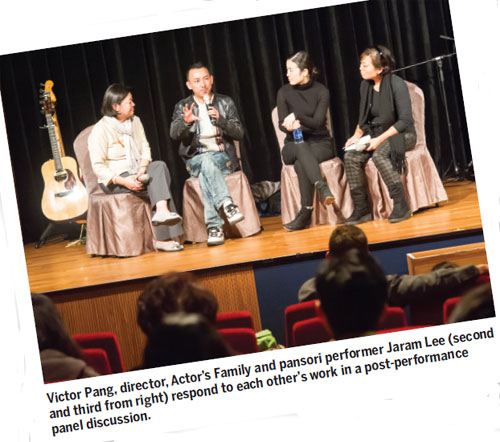
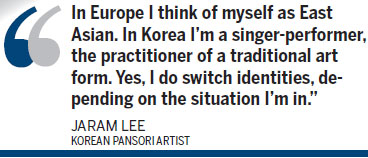
|
Jaram Lee's effortless switching between a whole range of characters - male-female, young-old, good-bad - is mesmerizing. |
|
The Actor's Family rendition of Brecht's play makes use of contemporary Hong Kong lingo. |
(HK Edition 12/16/2014 page7)
